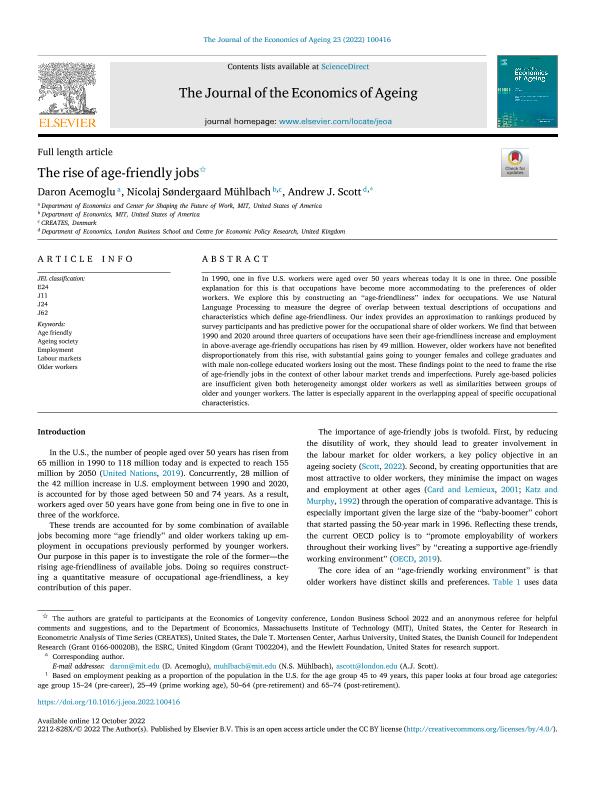The rise of age-friendly jobs

Contenido multimedia no disponible por derechos de autor o por acceso restringido. Contacte con la institución para más información.
| Tag | 1 | 2 | Valor |
|---|---|---|---|
| LDR | 00000cab a2200000 4500 | ||
| 001 | MAP20220034609 | ||
| 003 | MAP | ||
| 005 | 20221122155845.0 | ||
| 008 | 221122e20221031esp|||p |0|||b|spa d | ||
| 040 | $aMAP$bspa$dMAP | ||
| 084 | $a931.2 | ||
| 100 | 1 | $0MAPA20220009522$aAcemoglu, Daron | |
| 245 | 1 | 0 | $aThe rise of age-friendly jobs$cDaron Acemoglu |
| 520 | $aIn 1990, one in five U.S. workers were aged over 50 years whereas today it is one in three. One possible explanation for this is that occupations have become more accommodating to the preferences of older workers. We explore this by constructing an age-friendliness index for occupations. We use Natural Language Processing to measure the degree of overlap between textual descriptions of occupations and characteristics which define age-friendliness. Our index provides an approximation to rankings produced by survey participants and has predictive power for the occupational share of older workers. We find that between 1990 and 2020 around three quarters of occupations have seen their age-friendliness increase and employment in above-average age-friendly occupations has risen by 49 million. However, older workers have not benefited disproportionately from this rise, with substantial gains going to younger females and college graduates and with male non-college educated workers losing out the most. These findings point to the need to frame the rise of age-friendly jobs in the context of other labour market trends and imperfections. Purely age-based policies are insufficient given both heterogeneity amongst older workers as well as similarities between groups of older and younger workers. The latter is especially apparent in the overlapping appeal of specific occupational characteristics. | ||
| 650 | 4 | $0MAPA20080540876$aEmpleo | |
| 650 | 4 | $0MAPA20100044407$aPersonas mayores | |
| 650 | 4 | $0MAPA20080568771$aEnvejecimiento | |
| 651 | 1 | $0MAPA20080638337$aEstados Unidos | |
| 773 | 0 | $wMAP20210010194$g31/10/2022 Volumen 23 - 2022 , 13 p.$tThe Journal of the economics of ageing $dOxford : Elsevier ScienceDirect, 2021- |

